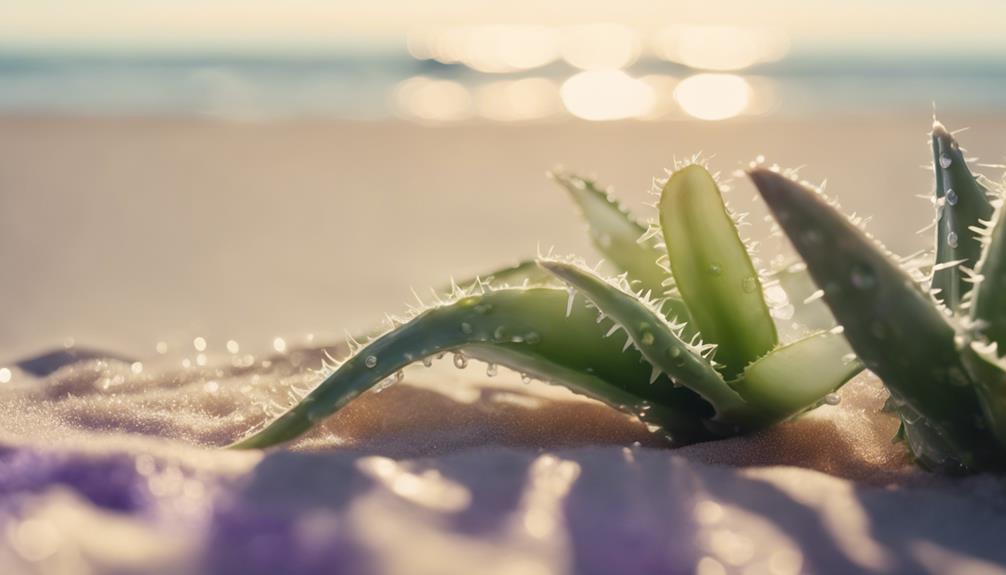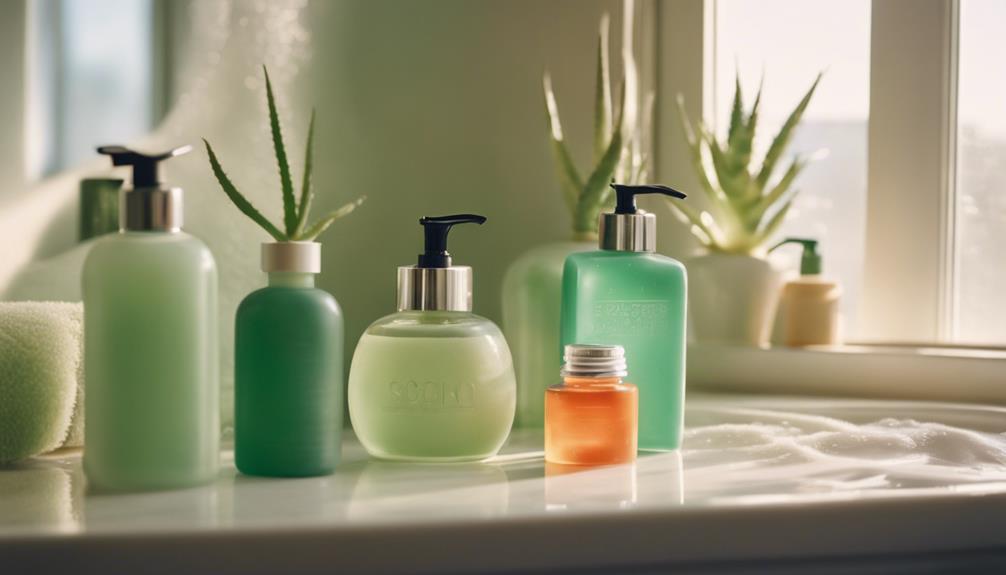Experiencing a post-tanning itch? No need to worry, you are not alone! This uncomfortable itching sensation is often a sign that your skin is reacting to dryness or the UV rays. Picture your skin as a sponge – if it becomes too dry, it can become irritated. In addition, if you are allergic, new tanning lotions may also trigger a reaction. To alleviate the discomfort, apply a quality moisturizer or try soothing lotions with aloe vera. Gradually increasing your tanning sessions may also help. It is important to listen to your skin – persistent itching may indicate the need to consult with a specialist. Interested in more tips and tricks? Stay tuned!
Key Takeaways
- Post-tanning itchiness often results from skin dehydration due to UV exposure, leading to irritation and discomfort.
- Allergic reactions to new tanning lotions or their ingredients can contribute to itchiness.
- Hydrating the skin with moisturizers containing aloe vera or hyaluronic acid helps prevent and alleviate post-tanning itch.
- Recognizing symptoms of tanning bed rash, such as raised bumps or prolonged itching, is crucial for timely intervention.
Understanding Post-Tanning Itch
Experiencing itchiness after tanning is a common skin response that often signals irritation or dryness due to UV exposure. It's like your skin's way of saying, 'Hey, I need some moisture here!'
When you spend time under those sun rays or in a tanning bed, your skin can get a bit cranky, especially if you overdo it. Itchiness can also pop up if you've used a new tanning lotion that didn't agree with you.
So, next time you feel that annoying itch, remember it's a sign to treat your skin right. Hydrating it with a good moisturizer can work wonders!
Have you ever tried a cooling lotion? It's like giving your skin a rejuvenating drink after a hot day!
Common Causes of Itchiness
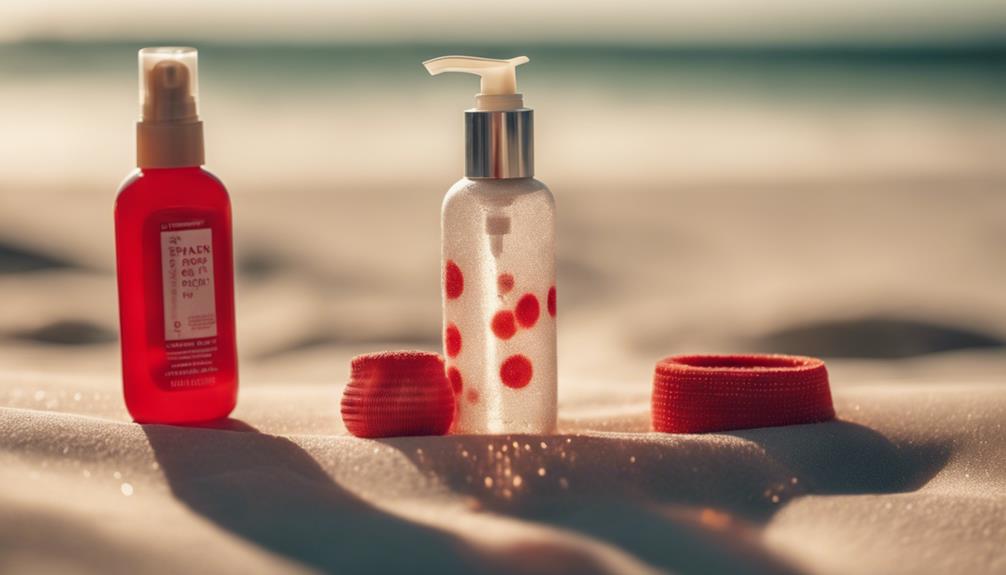
Tanning can trigger itchiness for several reasons, including skin dehydration from UV exposure and reactions to tanning products.
When you spend time in the sun or a tanning bed, your skin can become dry and irritated, causing that annoying itch. It's like when you forget to drink water during gym class—your body just craves moisture!
Plus, if you use tanning lotions, you might be sensitive to certain ingredients, such as fragrances or preservatives, which can lead to pesky rashes.
Think of your skin as a sponge; if it dries out, it's going to squeak!
Importance of Skin Hydration
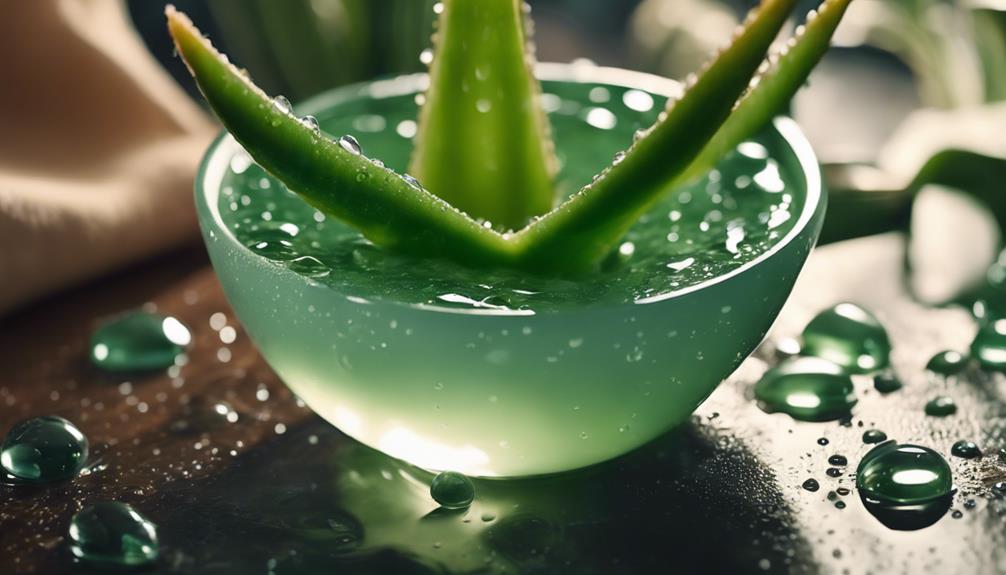
Maintaining proper skin hydration is essential for preventing discomfort and irritation after exposure to UV rays. Think of your skin like a sponge; when it's dry, it can feel tight and itchy. After tanning, your skin's moisture can take a hit, so it's vital to replenish it! You wouldn't want a thirsty sponge, right?
Applying a good moisturizer can be your skin's best friend, especially if it has ingredients like aloe vera or hyaluronic acid. These not only hydrate but soothe any itchiness that might pop up.
Recognizing Tanning Bed Rash

After ensuring your skin is well-hydrated, it's important to know how to identify tanning bed rash, which can manifest as raised bumps or redness indicating irritation. You might feel like a pizza with pepperoni spots!
If you notice incessant itching or inflamed patches that last over five days, it's time to pay attention. Your skin's trying to tell you something!
Don't ignore symptoms like oozing or discharge, as they could mean you need a doctor's help.
Keeping your tanning area clean and using sunscreen can help prevent these pesky rashes.
Effective Tanning Techniques

Your skin's well-being hinges on adopting effective tanning techniques that minimize irritation and maximize results.
First off, start slow! Gradually increasing your tanning sessions helps your skin get used to the rays without turning into a lobster. You wouldn't jump into the deep end of a pool right away, right?
Next, choose hypoallergenic tanning lotions to keep allergic reactions at bay.
Don't forget to take breaks during your sessions; your skin will thank you!
Always moisturize before and after tanning to prevent dryness and that pesky itch. Think of it as giving your skin a rejuvenating drink.
When to Consult a Dermatologist
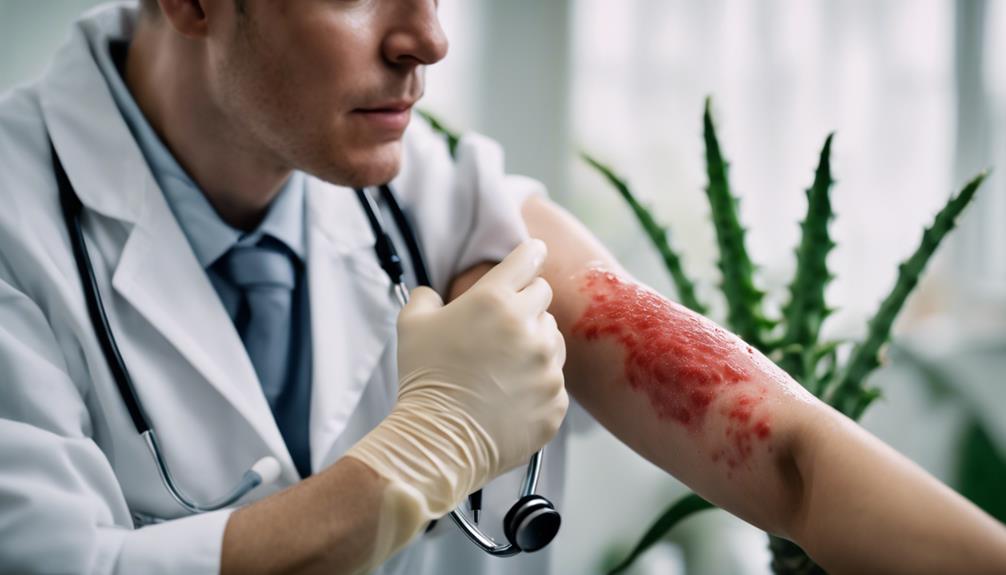
Knowing when to consult a dermatologist is essential for addressing persistent skin issues that can arise after tanning. If you're still itching after a few days, or if excessive scratching has left your skin feeling like a battle zone, it's time to call in the experts. Signs like pus, fever, or rashes that don't seem to let up are your skin's way of waving a red flag! Check out the table below for quick guidance:
| Symptoms to Watch For | When to Seek Help | Possible Skin Issues |
|---|---|---|
| Persistent itch for days | Immediately | Skin infection |
| Pus or oozing | Urgently | Bacterial infection |
| Fever | Right away | Serious skin condition |
| Rash lasting over 5 days | Soon | Tanning bed rash |
| Excessive scratching | As soon as possible | Irritation or infection |
Don't hesitate; your skin deserves the best care!
Home Remedies for Relief

What simple home remedies can help soothe the itchiness and irritation that often follow tanning sessions? Well, you've got a few options that can make a world of difference!
First, slather on some aloe vera gel—it's like a cool hug for your skin.
If you've got oatmeal at home, mix it with water to create a soothing paste; trust me, your skin will appreciate this spa treatment!
You can also whip up a chamomile tea rinse—just brew, cool, and apply it to your itchy spots.
Remember to moisturize regularly, too! Keeping your skin hydrated can work wonders.
Frequently Asked Questions
Can Certain Skin Types Be More Prone to Post-Tanning Itchiness?
Yes, certain skin types, like sensitive or dry skin, can be more prone to post-tanning itchiness. You might experience increased irritation due to their lower moisture levels and heightened reactions to UV exposure.
How Do I Choose the Right Tanning Lotion for Sensitive Skin?
About 30% of people experience skin irritation from tanning products. To choose the right lotion for sensitive skin, look for hypoallergenic options, avoid fragrances, and test a small area before full application to prevent reactions.
Are There Specific Foods That Can Help With Skin Hydration?
Yes, specific foods can boost skin hydration. Incorporate water-rich fruits like watermelon and cucumbers, along with healthy fats from avocados and nuts. These choices help keep your skin moisturized and radiant from within.
What Are the Long-Term Effects of Frequent Tanning on Skin Health?
Did you know that about 90% of skin aging is due to UV exposure? Frequent tanning can lead to premature wrinkles, increased risk of skin cancer, and pigmentation issues, so it's essential to prioritize skin health.
Can Stress or Hormones Influence Post-Tanning Skin Reactions?
Yes, stress and hormones can influence your skin's reactions. Increased stress levels may worsen itchiness or irritation, while hormonal fluctuations can affect skin sensitivity. Staying mindful of these factors can help you manage your skin better.
Can Using Moisturizer After Tanning Cause Post-Tanning Itch?
Using moisturizer after tanning can sometimes cause post-tanning itch. The moisturizer and tanning relationship can be complex, as certain ingredients in the moisturizer can irritate the skin when applied after tanning. It’s important to use a moisturizer specifically designed for post-tanning to avoid this issue.
Conclusion
So, the next time you find yourself scratching that post-tanning itch, remember it's not a secret code from the universe, just your skin's way of asking for some TLC.
By keeping your skin hydrated and knowing when to reach out for help, you can enjoy that sun-kissed glow without the annoyance.
Think of it like watering a plant—your skin thrives when you give it what it needs!
So, embrace the glow and keep that itch at bay!
